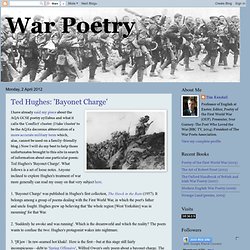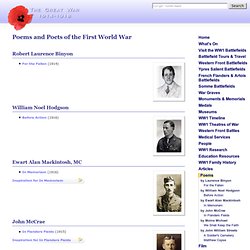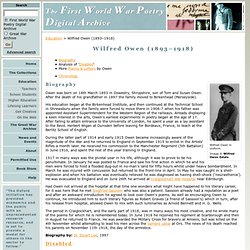

AQA Lit War poetry imagery and rhythm. Pre 1914 war poems podcasts. AQA - Anthology Zone - Wilfred Owen. War Poetry: Ted Hughes: 'Bayonet Charge' I have already said my piece about the AQA GCSE poetry syllabus and what it calls the 'Conflict' cluster.

(I take 'cluster' to be the AQA's decorous abbreviation of a more accurate military term which, alas, cannot be used on a family-friendly blog.) Now I will do my best to help those unfortunates brought to this site in search of information about one particular poem: Ted Hughes's 'Bayonet Charge'. What follows is a set of loose notes. Anyone inclined to explore Hughes's treatment of war more generally can read my essay on that very subject here. 1. 2. 3. 4. 5. 6. 7. 8. 9. 10. 11. 12. Hughes wrote far better poems than 'Bayonet Charge'. Postscript: for an account of Jane Weir's 'Poppies', see here. WW1 Poems. Robert Laurence Binyon For the Fallen (1914) William Noel Hodgson Before Action (1916) Ewart Alan Mackintosh, MC In Memoriam (1916) Inspiration for In Memoriam John McCrae In Flanders Fields (1915) Inspiration for In Flanders Fields Moina Michael We Shall Keep the Faith (1918)

"Prose and Poetry" web sites. Literary Connections: The First World War in Literature - materials for AQA A Level English Literature (LTA6 and new AS) Wilfred Owen (1893–1918) Chronology Wilfred Owen in uniform Image © Wilfred Owen Estate Biography Owen was born on 18th March 1893 in Oswestry, Shropshire, son of Tom and Susan Owen.

After the death of his grandfather in 1897 the family moved to Birkenhead (Merseyside). His education began at the Birkenhead Institute, and then continued at the Technical School in Shrewsbury when the family were forced to move there in 1906-7 when his father was appointed Assistant Superintendent for the Western Region of the railways. During the latter part of 1914 and early 1915 Owen became increasingly aware of the magnitude of the War and he returned to England in September 1915 to enlist in the Artists' Rifles a month later. 1917 in many ways was the pivotal year in his life, although it was to prove to be his penultimate. Had Owen not arrived at the hospital at that time one wonders what might have happened to his literary career, for it was here that he met Siegfried Sassoon who was also a patient. Biography by: Dr. Disabled.